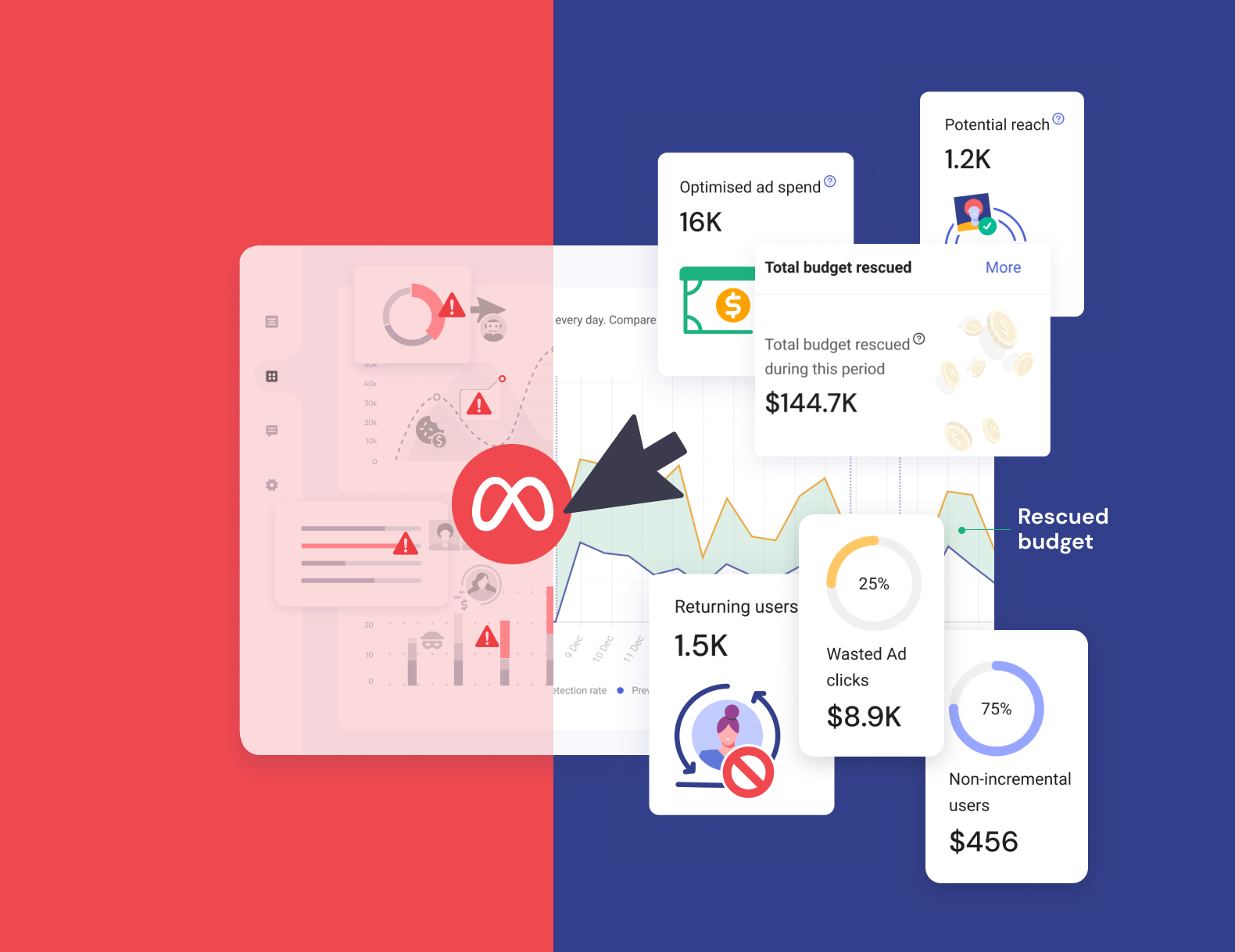Betting on Clean Data: How Sportsbooks Can Win Against Affiliate Abuse

Why Affiliate Fraud Is a Growing Threat for Sportsbooks
Affiliate programmes drive acquisition for most sportsbooks
Affiliates remain one of the most powerful acquisition channels for sportsbooks, helping them tap into global iGaming demand (the sector generated around US $44.2 billion in sports betting revenue in 2024). They fuel sign-ups at scale and often deliver new first-time depositors at a lower cost than direct media buying, supported by structures such as 30–50% revenue share or CPA deals.
But with heavy reliance comes heavy risk. Fraudulent affiliates exploit attribution models and distort data, leaving sportsbooks paying for conversions they never truly earned.
Misattribution and commission theft silently drain millions
Every hijacked conversion is commission paid to the wrong partner. Tactics like click injection, last-second redirects, and cookie stuffing manipulate attribution so that fraudsters pocket payouts without adding value.These leaks often slip under the radar of affiliate program reporting, quietly draining sportsbook margins.
For a deeper dive into how cookie stuffing inflates acquisition costs, see our blog The Honey Trap: Hidden Dangers of Cookie Stuffing.
Invalid traffic and fake sign-ups distort true performance data
The real cost isn’t just lost commission. Invalid traffic; from bots, fake sign-ups, and non-genuine leads, pollutes the very metrics sportsbooks rely on: CPA, ROI, player value, even LTV models. Once acquisition data is corrupted, optimisation decisions are driven by false signals. Budgets get scaled in the wrong direction, and long-term growth strategies risk being built on sand.
The Common Types of Affiliate Fraud in Sports Betting
Attribution hijacking through click injection and redirects
Click injection is a sophisticated mobile fraud where a malicious app fires off a fake click just before a legitimate conversion or app install, tricking attribution systems into crediting the fraudster with the commission, despite having no real role in driving the user. This distorts attribution, wastes ad spend, and skews performance metrics.
Cookie stuffing that steals commission without engagement
With cookie stuffing, fraudsters secretly drop tracking cookies into a user’s browser, via pop-ups, iframes, images or script, so when the user later converts organically, the fraudster gets paid regardless of involvement.
According to research, cookie stuffing accounts for an estimated 5–10% of affiliate transactions, while around 17% of affiliate traffic is fake, costing businesses approximately US $3.4 billion annually. Watch our explainer on cookie stuffing here:
Incentivised traffic and bonus abuse with low-value players
Some affiliates attract players through rewards and bonuses rather than betting intent. These users churn quickly, delivering low long-term value. AI-driven bots further scale this abuse, exploiting promotional offers across sportsbooks and draining margins.
Our CMO recently explored this trend in Rising Bonus Abuse in Sports Betting: Fraudsters Leveraging Hidden AI Powered Bots.
Misleading creative and non-compliant traffic sources
Some affiliates go beyond fair play such as running misleading ads, bidding on operator brand terms, or funnelling traffic from prohibited sources such as banned geographies or incentivised channels. While this might inflate traffic numbers in the short term, it often results in low-value or fraudulent players. More critically, it puts sportsbooks at risk of breaching compliance requirements, undermines trust with regulators, and can cause lasting reputational damage that far outweighs any temporary gains.
Why Traditional Affiliate Monitoring Falls Short
Rule-based checks miss advanced manipulation tactics
Many affiliate platforms rely on static, rule-based checks to detect fraud. The problem is that fraudsters adapt faster using device spoofing, IP rotation, and behaviour masking to bypass simple filters. What looks like a legitimate player on the surface may in fact be a manipulated event that slips through undetected.
Reactive detection fails to prevent misattribution in real time
Most affiliate fraud is only flagged after commission has already been paid. By the time invalid activity is uncovered, budgets are gone and fraudulent partners have already profited. Reactive detection may catch patterns eventually, but it does nothing to prevent ongoing leakage in real time.
Limited reporting leaves blind spots in partner performance
Affiliate platforms typically offer high-level reports but little depth. Without click-level attribution and conversion validation, sportsbooks can’t distinguish between genuine performance and manipulated activity. This lack of visibility creates blind spots that make it easy for bad affiliates to hide in plain sight.
How Sportsbooks Can Protect Their Affiliate Programmes
Track the full user journey from click to conversion
Monitoring every stage of the funnel: click, view, and conversion, gives sportsbooks the visibility to verify affiliate activity. This makes it possible to separate genuine referrals from manipulated traffic and filter out invalid sources before they distort results.
Validate conversions to ensure clean, fair attribution
Not every sign-up is valuable. Conversion validation ensures only real, incremental players trigger commission. This protects sportsbooks from paying out on fake leads, bots, or bonus hunters that add no long-term value.
Block fraudulent referrals and invalid sign-ups before payout
Click fraud prevention software like TrafficGuard for Affiliate blocks invalid traffic in real time by analysing the entire user journey and validating each conversion before commission is paid. Suspicious referrals, fake leads, and bot-driven sign-ups are intercepted at the source, ensuring sportsbooks only reward affiliates for genuine, incremental players. This not only protects budgets but also strengthens trust in affiliate partnerships and delivers clean data for smarter optimisation.
Watch how TrafficGuard protects affiliate programmes in action:
Key Features of Affiliate Fraud Protection
Predictive modelling to uncover hidden fraud patterns
Fraud tactics constantly evolve, from click injection to sophisticated bot-driven sign-ups. TrafficGuard uses predictive modelling and full-funnel analysis to surface anomalies that rule-based checks miss from unusual traffic spikes to suspicious referral methods. By exposing these hidden patterns, sportsbooks can stop affiliate fraud before it eats into commission payouts.
Transparent reporting for fair partner payouts
Affiliate programmes depend on trust, and that starts with transparency. TrafficGuard provides granular, auditable reporting that shows exactly which partners are driving legitimate conversions and which are siphoning budget with fake or low-value traffic. By making invalid activity visible, sportsbooks can cut fraudsters out of the chain, reconcile with confidence, and ensure high-value partners are paid fairly.
Seamless integration with affiliate management platforms
Affiliate fraud protection shouldn’t disrupt existing workflows. TrafficGuard plugs directly into leading affiliate management platforms like Impact, connecting via tracking templates and AMP APIs. Setup takes minimal lift, while sportsbooks gain live dashboards that highlight invalid traffic trends, partner performance, and potential budget recovery, whether through automated reversals on Impact or reconciliation lists on other AMPs.
Why Clean Data Gives Sportsbooks the Edge
Pay only for incremental, legitimate conversions
TrafficGuard verifies every click, view, and conversion across the entire user journey. This ensures sportsbooks only pay for genuine new players, not fake sign-ups, bots, or recycled traffic. Every commission paid is tied directly to measurable growth.
Build stronger, trust-based affiliate partnerships
By filtering out attribution hijacking, cookie stuffing, and non-compliant referrals, TrafficGuard creates a level playing field where legitimate affiliates thrive. Fraudsters are cut out, while trusted partners are rewarded for genuine performance: building stronger, long-term relationships that scale.
Scale acquisition efficiently with accurate insights
With clean, verified data, sportsbooks can reinvest with confidence. TrafficGuard’s dashboard shows exactly how much of your affiliate spend is protected, with clear visibility into fraud trends, partner quality, and recovered budget. This clarity fuels faster optimisation cycles and smarter scaling decisions, compounding ROI over time.
Prevent click fraud and protect your affiliate spend with TrafficGuard →
Conclusion
Affiliate fraud is silently draining sportsbook growth
From cookie stuffing to fake sign-ups, affiliate fraud is an invisible tax on sportsbook acquisition.
Clean attribution protects ROI and long-term partnerships
With advanced click fraud prevention, sportsbooks can validate every conversion, protect budgets, and strengthen trusted affiliate relationships. Clean data is not just protection; it’s the foundation for scale.
Fraudsters aren’t slowing down, and neither should your protection. Download our Affiliate Fraud Whitepaper to see how global brands are tackling the problem at scale.
FAQs & Key Takeaways
- How can sportsbooks detect affiliate fraud in real time?
Through click fraud prevention software such as TrafficGuard that tracks the full funnel, validates conversions, and blocks invalid referrals before commission is paid. - What types of affiliate fraud cause the most damage?
The most common include attribution hijacking, cookie stuffing, fake leads, bonus abuse, and traffic from non-compliant sources. - Do affiliate platforms’ built-in filters prevent fraud?
Not effectively. Most platform checks happen after the fact and provide limited transparency. Dedicated click fraud prevention software offers real-time protection and deeper reporting. - What makes TrafficGuard’s affiliate solution different?
TrafficGuard analyses the entire user journey, integrates directly with AMPs, and provides transparent fraud insights so you only pay for incremental conversions. - Why does clean data matter so much for sportsbooks?
Because poor data drives poor optimisation. With clean attribution, sportsbooks can scale confidently, reduce CAC, and maximise ROI.
Get started - it's free
You can set up a TrafficGuard account in minutes, so we’ll be protecting your campaigns before you can say ‘sky-high ROI’.
Subscribe
Subscribe now to get all the latest news and insights on digital advertising, machine learning and ad fraud.








